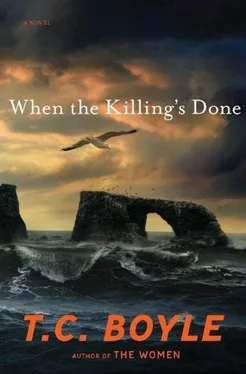Francisco had set the dishes aside to dry and was plying the mop on the concrete floor now, shifting the mud from one corner to the other in long yellowish streaks. The floor was always dirty, forever dirty, but that was a matter of degree — until she’d nagged Bax to have the supply barge off-load a hundred sixty-pound bags of concrete and until that concrete was loaded ten bags at a time in the back of the pickup and brought up here to be mixed in the wheelbarrow, poured, tamped and smoothed in place, the floor had been actual dirt, literal dirt, trodden and compacted by how many generations of sheepherders’ boots she couldn’t begin to imagine. The other substantial building on the property — the eight-room bunkhouse — was of wood-frame construction and as far as she knew had always had a pine floor, which was, if anything, even dirtier than the old dirt floor of the main house, but nothing to worry over. The hands took turns sweeping it and every once in a long concatenation of weeks even took a mop to it. They had their own communal room, a few rough chairs, a card table and a potbellied stove, but the main house was where they gathered for their meals and where they felt — at least in her presence — as if they’d come home, the talk at supper of mothers long dead, of haciendas that no longer existed in the mind-clouded valleys of Arizona, New Mexico and Old Mexico too.
She was enveloped in the sweet hot fragrance of the stew as soon as she stepped in the door, the windows steamed over, the big open space that served as kitchen, dining room and gathering place suddenly dense with it, the released molecules of the lamb she’d chunked and the spices she’d crumbled between her palms combining and rising and drifting till even Bax, frowning over his reading glasses in the whitewashed bedroom upstairs, must have been aware of them. Shifting the big pot to the right of the stove, she took out the frying pan, greased it and cracked half a dozen eggs in a bowl. She added a spot of condensed milk and a handful of grated cheese, beat the mixture to a froth and poured out the makings of two thin omelets, spiced only with salt and pepper. Then she laid out four slices of bread, slathered two of them with her own fiery homemade pico de gallo , eased the first omelet between them and poured out a fresh mug of coffee. “Francisco, when you have a minute,” she called, and no irony intended here either, because things were easy on the ranch, “would you take this up to Bax?”
He nodded and gave her a grin. “Yes,” he said, “sure, no hay problema .” They were both aware of the subtext here: she was making use of Francisco as intermediary for the very good reason that if she’d taken the plate up herself she would have had to listen to Bax’s dammed-up torrent of advice, complaints and animadversions, not to mention the mental list of chores, niggling worries and very pressing matters he was composing even now and had been composing ever since he took to bed.
She used ketchup on the second sandwich (Anise had been crazy for ketchup since she was a little girl, smearing it on anything, saltines, pretzels, bananas, fresh-sliced cucumbers and even, at least once she knew of, on a Hershey bar), wrapped it in tinfoil and filled the thermos with hot chocolate. Then she pulled on her rain slicker and the sombrero Francisco’s cousin Manuel had brought her back from Tijuana the previous year after a week-long post-shearing debauch, and went back out into the rain. She skirted the wash, which had begun to flow now with the reanimated Scorpion River, and headed up through the grove of eucalyptus to the meadow beyond, where the sheep stood sodden and gray, like so many heaps of dirty rags scattered across the new grass as far as she could see. It was a scene out of some immemorial past and she couldn’t help thinking of the first naked primitives who ran down the first wild ram and killed and cooked and ate it and sat round with swollen bellies thinking how nice it would be to have something like that tethered to the nearest tree so you could have meat and offal and a good warm fleece anytime you wanted it. Here was the ur-industry, as old as the tribes themselves. And Cain slew Abel because Abel followed the herds and Cain put seeds in the ground and what kind of sacrifice to the greedy God above was a mound of peas and squash compared to the haunch of a freshly slaughtered lamb?
Anise’s tarp — fireman’s red, or red-orange, a color you didn’t find in nature, at least not on the West Coast — shone wetly on the far edge of the field. Rita could see her sprawled legs, her hunched shoulders, the black-and-white dog with his head in her lap, the book propped up against the dog’s back and her daughter doing what she did all on her own without hassle or reminder, studying, learning, making herself a better person. Anise had already advanced beyond anything she or Bax could help her with, aside from guitar lessons, and the correspondence course, with its weekly standards and monthly planner, couldn’t begin to keep up with her. She wasn’t yet fifteen and she was already doing work equivalent to what they’d expect of a college freshman, and all on her own. Rita was amazed anew each time she saw her bent to her work — the discipline and determination she showed, which was nothing at all like what she’d experienced herself, not with academics anyway. She’d been too edgy, too eager to throw it all over and steal away to the Village and haunt the cafés and clubs, and what had that led to? To nothing. To a false life and false hopes. Anise was different. Anise had a future. And the longer she stayed away from the trouble of the world, the better.
“Hey, Buttercup!” she heard herself call, rain on her hat like a spastic drumbeat, the ewes all around her licking their newborns, and here was Bumper, streaking through the grass to her even as her daughter lifted her head and gave her a faraway look.
In the next moment she was easing down beside her under the tarp and offering the egg sandwich, which Anise, setting aside the book, ignored in favor of the hot chocolate. There was a wet thrashing of paws and tail and then the dog was crowding in beside them, sniffing at the warm ripples of the foil. “You better eat that before it gets cold,” she said.
“What is it? Not lamb?”
“Fried egg. With a ton of ketchup.”
She watched her daughter unscrew the cap of the thermos and pour out a cup of chocolate, drop by drop, as if it were wine of rare vintage. And now she pushed the sandwich on her again and Anise took it and laid it in her lap, where it balanced precariously between the dog’s probing wet nose and the damp sleeping bag she was perched on. Anise was tall, like Toby — already five-eight — and as she shifted position, she folded her legs under her, long legs, legs she could grow into, and rescued the sandwich at the last minute, as if it were an afterthought. Sipping, her eyes dropping to the glossy cover of the book ( Studies in the American Story, From Hawthorne to Hemingway , $25.95, an amount they’d had to scrape to come up with), she murmured, “I really like this one story in my book? It’s called ‘Bartleby, the Scrivener.’ You ever read it?”
It sounded familiar, but if she had read it, it would have been back in high school. “Maybe,” she said. “But a long time ago in a galaxy far, far away. It doesn’t have sheep in it, does it?”
“ Please .” Anise froze up, irritated suddenly, and gave her a hard look. She could see her daughter was in a mood, ready to open up on her about how bored she was and how much she hated sheep and sheep ranches and islands, and if you came right down to it, life, life itself. She watched that skein of complication run through her eyes in a cold accusatory flash, but then Anise just shrugged and let it go. “I mean, I don’t know if you could care, but it’s about an office and a scrivener — he copies things by hand, I guess, because they didn’t have Xerox machines or anything like that back then. And whenever the boss asks him to do something he says, ‘I would prefer not to.’ ”
Читать дальше












